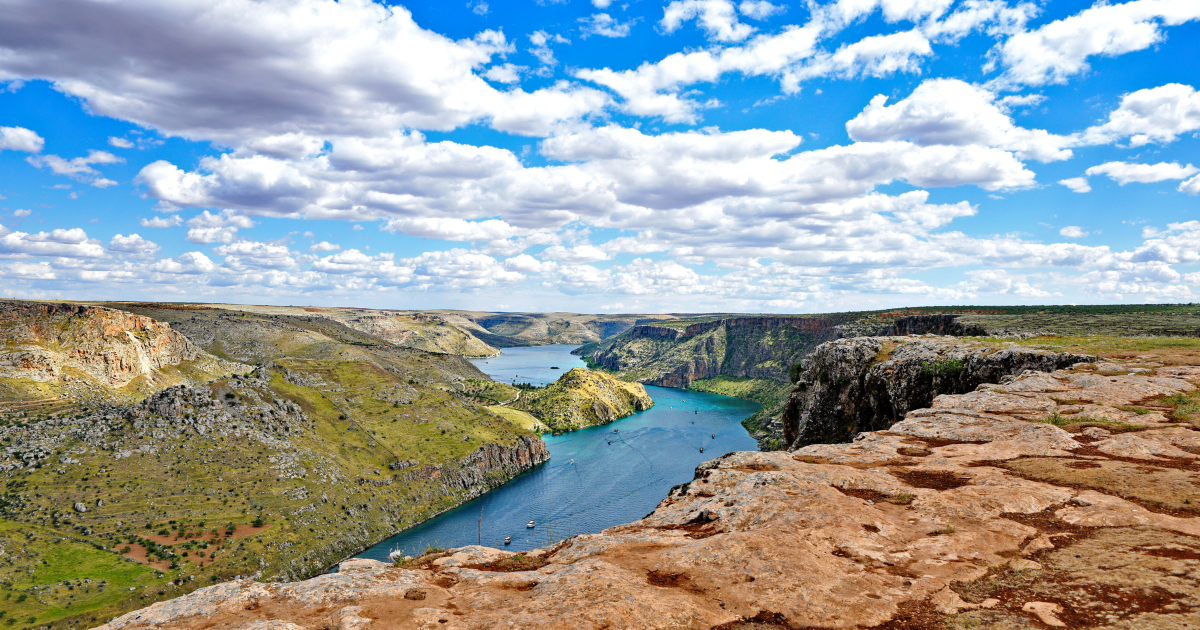What is the Significance of the Euphrates River in the Bible?

The Bible mentions the Euphrates River numerous times. This long river has played an important role in history. It also has spiritual significance. The Euphrates River has fascinating symbolic meaning in the Bible and is mentioned in biblical prophecies about it drying up. Learning about the Euphrates River can help us understand more about God’s power.
Where Is the Euphrates River?
The Euphrates River is a major river in Western Asia that flows from its source in Turkey through Syria and Iraq before finally emptying into the Persian Gulf. The river is approximately 1,740 miles long. It has played an important role in the region's history, serving for thousands of years as a vital source of water for people to drink and irrigate crops, as well as a major transportation and trade route. The Euphrates River was a key factor in developing early civilizations, such as the Sumerian, Babylonian, and Assyrian empires. It is home to many ancient cities once major centers of civilization and culture, including Ur, Babylon, and Nineveh.
Why Is it Important?
Water from the Euphrates was used to irrigate crops, making agriculture possible in arid land. The river was also a key transportation route for people to travel and trade goods such as timber, precious metals, and textiles. Today, the Euphrates River remains an important source of water for irrigation, hydroelectric power generation, and drinking water for millions of people in Syria, Iraq, and Turkey. However, the river currently faces several challenges, including drought, dam construction, and pollution, which threaten its continued viability as a vital resource for the region.
What Does the Bible Say About the Euphrates River?
The Bible often mentions the Euphrates River as a geographical marker. Scripture also describes the river’s significance as a symbol of God’s power over the natural world that He created. The Euphrates River is a complex symbol in the Bible. It reminds us that God exercises both love and judgment. In various verses, the Bible mentions the Euphrates River in ways that speak of hope and destruction. It is often mentioned in connection with the history and geography of the ancient civilizations it flowed through and in prophetic passages that speak of future events.
In Genesis 2:14, the Euphrates is one of four rivers that flow from the Garden of Eden. This suggests that the Euphrates is a place of fertility and abundance. Genesis 15:18 mentions the Euphrates River as one of the boundaries of the land God promised to Abraham. Deuteronomy 1:7 and Joshua 1:4 mention the Euphrates when describing the land God promised to the Israelites. Those passages present the Euphrates as a place of hope and promise.
In Isaiah 8:6-8, the Euphrates River is a metaphor for God’s judgment for sin. God speaks of allowing the Assyrian army to invade and overwhelm Judah like “the mighty floodwaters of the Euphrates”: “Because this people has rejected the gently flowing waters of Shiloah and rejoices over Rezin and the son of Remaliah, therefore the Lord is about to bring against them the mighty floodwaters of the Euphrates – the king of Assyria with all his pomp. It will overflow all its channels, run over all its banks, and sweep on into Judah, swirling over it, passing through it and reaching up to the neck. Its outspread wings will cover the breadth of your land, Immanuel!”
The prophet Jeremiah foretells in Jeremiah 46:10 that Babylon will be conquered and the Euphrates River will be dried up: “But that day belongs to the Lord, the Lord Almighty – a day of vengeance, for vengeance on his foes. The sword will devour till it is satisfied, till it has quenched its thirst with blood. For the Lord, the Lord Almighty, will offer sacrifice in the land of the north by the River Euphrates.” That passage shows God’s control over the land and river he created.
Jeremiah 50:38-39 describes the Euphrates River drying up in the future because of God’s judgment against sin. God declares in those verses: “A drought on her waters! They will dry up. For it is a land of idols, idols that will go mad with terror. … It will never again be inhabited or lived in from generation to generation.”
In Revelation 16:12, the Euphrates River dries up, allowing evil kings to invade Israel: “The sixth angel poured out his bowl on the great river Euphrates, and its water was dried up to prepare the way for the kings from the East.” That passage suggests the Euphrates is a place of judgment and destruction at that point in history.

Photo Credit: ©GettyImages/YILMAZUSLU
Meaning of the Euphrates River Drying Up
Like all rivers, the Euphrates River may dry up for a non-spiritual reason simply because people do not take good care of the river’s environment. Spiritually, Bible scholars have offered various interpretations of Bible passages about the Euphrates River drying up. Some see it as a symbol of the decline and fall of the Babylonian Empire, which was a powerful force in the ancient world but eventually lost its dominance. Others see it as a sign of the end times, which lead to when Jesus will return to judge the world and separate the righteous from the wicked. I
n that interpretation, the Euphrates River drying up may point to the unleashing of the forces of darkness on the world. It could be referring to when the Antichrist will gather his armies to invade Israel. In that scenario, the dry riverbed of the Euphrates can allow the armies to cross the river and attack Israel. We don’t know precisely when that will happen. But pondering the Euphrates drying up during the end times – whenever that occurs – is a sobering reminder that God controls history. He will bring judgment on the world for its sins, but he will also protect his people. We can trust in God, even in the midst of the darkest of times.
Ultimately, the biblical meaning of the Euphrates drying up is a matter of interpretation and debate. What is clear, however, is that the image of the river running dry is a powerful symbol of the spiritual dryness that can afflict people who turn away from God. The solution for spiritual dryness is a relationship with God, our living water. The Bible refers to God as living water numerous times. Jesus reveals in John 4:14: “… whoever drinks the water I give them will never thirst. Indeed, the water I give them will become in them a spring of water welling up to eternal life.” In John 7:37-38, Jesus encourages us: “Let anyone who is thirsty come to me and drink. Whoever believes in me, as Scripture has said, rivers of living water will flow from within them.”
Water splashes God’s life-giving role into our focus, which I share in the nature chapter of my book Wake Up to Wonder. God gives us life, sustains our lives, and saves and renews us spiritually. When we think of water – like the mighty Euphrates River – in a spiritual context, we can be inspired by awe at the wonder of God’s work as our living water. Pondering a river like the Euphrates drying up reminds us that we need to stay close to God’s living water to prevent spiritual dryness in our own lives.
Conclusion
The Euphrates River has spiritual significance for Christians because the Bible mentions it in historical and prophetic contexts. It symbolizes both positive and negative change and points to God’s power over the natural world he has created. The Euphrates also can inspire us to reflect on the battle between good and evil and the contrast between spiritual dryness and the spiritual fulfillment that God provides through Jesus – who provides the ultimate satisfaction for our spiritual thirst.
Photo Credit: ©Getty Images/Daphnusia

Originally published May 04, 2023.




